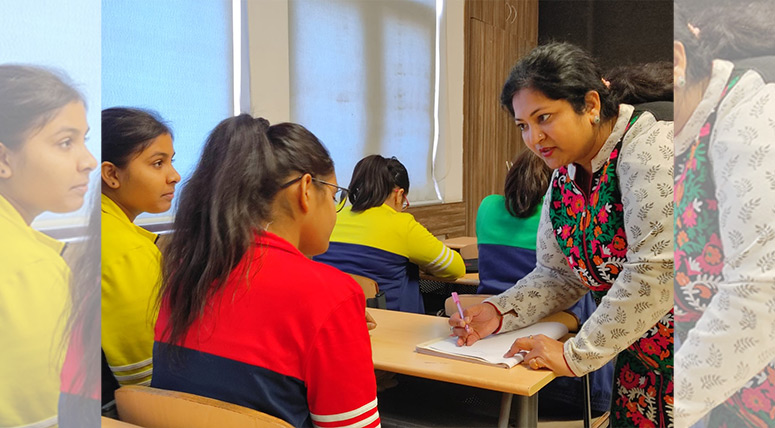#CBSEXAMTipsTricks12th: Math
Are you afraid of solving complex numerical questions?
Do you have Mathophobia?
What if you come to know about the easiest way to destroy your Math fear?
Wondering?
Yes, it is possible!!
FROM THE EXPERT’S DESK
The following are a few suggested preparation tips:
- Go through the content and the syllabus properly and understand the marks allotted to each topic.
- The subject code for core Mathematics for grade 12 is 041.
- The duration of the question paper is 3 hours.
- Maximum marks are 80.
- 20 marks are awarded by the school based on practical and overall assessment throughout the session.
- It is highly recommended that students preparing for CBSE Class 12th Math Board Exam 2023 should first focus on (easy to prepare) units with maximum weightage in Board Exam.
- It’ll help to boost morale, and eventually lay a foundation to move on to more difficult topics.
- NCERT and NCERT Exemplar book before any other book-
The NCERT textbooks provide an extensive range of exercise problems and solved examples on each topic, which is more than adequate to prepare for Board Exams. Keep a reference book beside NCERT textbooks for extra practice and clarification on complex problems.
- Plan first, and then prepare
Have a clear understanding of your syllabus and weight to various sections. This will definitely help you to decide how much time you should dedicate to each section. Plan as per the weightage of each unit as provided by CBSE for the session 2022-23 assessment:
| TOPICS | WEIGHTAGE OUT OF 80 |
| Calculus | 35 |
| Vector and 3-D Geometry | 14 |
| Algebra | 10 |
| Relation and Function | 08 |
| Probability | 08 |
| Linear Programming | 05 |
| Total | 80 |
| Internal Assessment | 20 |
The most feature component of a question paper is the long form questions (5marks), which usually come from one of the following sections: Calculus and Differential Equations, which consists of application-based challenging questions. This needs to be prepared thoroughly. Rest of the topics don’t necessitate any further practice beyond what you’ve already done with your NCERT textbooks.
- Practicing Sample Papers and Previous Years’ Paper is a Must
Examiners normally follow a pattern of repetition for specific critical questions over a number of years, which is why going over prior years’ exams is so vital. Make a point of doing the previous year’s papers while using a timer; this will help you enhance your speed, reasoning ability, and time management abilities.
- Answer in Steps
- Whenever you go through an answer, ensure to pay special attention to the steps that helped you to reach out to get the answer.
- You cannot simply write the answer and get full marks in Math, so simply paying attention to the figures is waste of time.
- Instead of all this, learn to keep the steps involved.
- You will definitely secure marks for each step.
- Attempting MCQs, Assertion-Reasoning, Case-Study Based Questions.
- Section A consists of 18 MCQ and 2 Assertion Reasoning based questions.
- Be patient while attempting Section A of your question paper.
- For MCQs, read them very carefully. Examine each option, use elimination method and choose the correct answer from the four similar appearing choices.
For assertion-reasoning based questions follow the given tips to answer assertion questions:
- Take time to read the assertion-reason questions
If you rush through the assertion questions, you may not be able to answer it correctly. So, read the question carefully to understand the assertion statement. Then, figure out whether the reason statement is true or not. Once you feel you have found the correct answer, read both the statements once more. This time, if you feel confident about your answer, go ahead and select the option that you think is right.
- Think of each statement independently
- Evaluate the given statements independently to figure out the correct answer.
- In certain questions, the reason provides the correct explanation for the given assertion statement, while in others it does not.
- If your concepts are clear, you will be able to quickly spot the inaccuracy in the explanation and select the correct answer.
- You need to think logically and use you conceptual understanding to analyze the scenario before answering assertion questions.
- Practice assertion questions
- Assertion questions can be confusing.
- You need to know the meaning of the options available to get the answer right.
- Here, practice tests can be useful.
For case study-based questions (Section E)
- Read the given passage carefully, analyze the goal of asking the question and then solve.
- Most of the case-based questions are going to be straight-forward.
- So, you can solve such questions easily if you have a good command of the concepts and formulas of Maths.
- Solve the questions given in the latest sample paper to get acquainted with this new type of question.
- End Rote Learning and Understand Deeply
It’s all about grasping the concepts in mathematics. As a result, cramming will not be of much use on the day of the exam. Try to grasp the principles of the formulas; they’re usually all built on a single conceptual framework, and if you grasp that, you’ll be able to avoid memorizing countless formulas.
- Self-evaluation and Self-assessment are Important
Begin by identifying your limitations and grey areas as a first step toward feeling less worries. Give several mock tests before the exam and clearly assess where do you stand and what are the mistakes being done, improvise them and again give the mock test.
Rather than making yourself feel awful about it, devote more time to fixing them. Maintaining a calm state of mind is more important than any preparation.
- Presentation is Very Important
Avoid doodling and overwriting; if you make a mistake, strike it out neatly with a single line and start over. Always give some breathing room between questions and begin a new part on a new page.
- Learn How to Manage Time
The reading time is the most important and should be used wisely. Read the instructions very carefully, maybe twice and make a note of any anomaly. Scan the paper and the sections and develop a broad framework of how you will attempt the test. Always leave 15-20 minutes at the conclusion of the exam to revise and correct your answers. Most importantly, sleep well before your exams so that you are not drowsy and unfocused at the time of answering questions.
- Some Books Useful for Solving Sample Papers:
- Question bank in mathematics Class 12th by ML Aggarwal (APC Publications)
- CBSE Pattern 15 sample papers mathematics class 12th by Arihant Publications.
So, cross your fingers and keep practicing sample papers and papers of prior years!
These suggestions can ensure you earn a perfect score in your CBSE Math Board Examination!
All the Best!
Author: Rachna Gupta, PGT Mathematics, MRIS Charmwood






